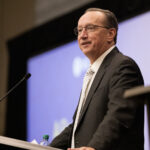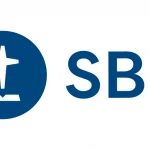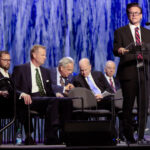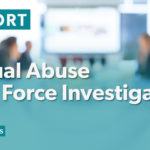 [1]
[1]NASHVILLE (BP) – Recorded meetings that were sealed following the work of the Great Commission Resurgence Task Force (GCRTF) in 2010 are now available at the Southern Baptist Historical Library and Archives.
The collection includes 57 compact disc recordings of GCRTF meetings that took place from 2009-2010 and a DVD of the task force’s report at the 2010 SBC Annual Meeting. Printed resources include a file of blog posts from the pray4gcr.com website and the GCRTF progress report issued on Feb. 22, 2010.
No paper documents or notebooks were transferred by the task force to accompany the audio recordings, said Taffey Hall, SBHLA director and archivist. The collection also does not include minutes, agendas, programs, notes, outlines or correspondence.
The recordings collectively extend to about 90 hours, with each CD containing from around a half-hour to more than an hour-and-a-half of audio.
The materials became available Monday (June 16) and can be viewed at the SBHLA offices located on the fourth floor of the Southern Baptist Convention building in downtown Nashville at the corner of 9th and Commerce streets. Office hours are 8 a.m.-4 p.m. Central, Monday through Friday. Appointments are not necessary but encouraged so SBHLA staff can prepare materials in advance.
Barriers to digitization
Southern Baptists approved [3] the Great Commission Resurgence Task Force’s report at the 2010 SBC Annual Meeting in Orlando. Recommendations included encouraging churches to give through “Great Commission Giving” in addition to the Cooperative Program as well as a restructuring of the North American Mission Board that shifted funds from partnerships with state conventions toward church planting.
In 2010, messenger Jay Adkins of Louisiana brought a motion for the task force proceedings to be released at that time rather than the 15-year period put forward by GCRTF members. That motion was denied by messengers.
Adkins, pastor of First Baptist Church in Westwego, La., chaired the Great Commission Resurgence Evaluation Task Force formed in 2023. A request by Adkins in September of that year also asked for early access to the sealed materials. But that, too, was denied. Messengers ultimately approved [4] the report brought by his team in Indianapolis in 2024.
Digitization of the materials and placing them online isn’t a viable option at the moment, said Hall. The SBHLA contains the widest and most diverse database of Southern Baptist archives in the world, including handwritten and typed manuscripts, 19th-century pamphlets and tracts, more than 1,400 Baptist periodicals and recordings ranging from those on Dictaphone to reel-to-reel and popular 20th-century Baptist radio programs to VHS tapes and DVDs.
“We provide necessary preservation and conservation measures on a variety of specially formatted items, descriptive metadata and cataloging,” she said. Those efforts also produce finding aids, or indexes, “to help researchers or anyone interested discover materials in our collection. Our digitization program, designed for both preservation and access, is a time-consuming and expensive process for us.”
A finding aid, including related materials, of the GCR Task Force collection has been made available by the SBHLA [5]. Duplicates of materials can be ordered [6], with audio recordings including a $25 charge per CD.
Southern Baptists approved a $509,100 comprehensive operating budget for the Historical Library and Archives at last week’s annual meeting in Dallas. The next-smallest budget went to the Ethics & Religious Liberty Commission, at $3.3 million. The SBHLA includes Hall and one other full-time employee, alongside two part-time staff in research and archiving.
“We are limited … as to the digitization projects made available on our website,” Hall told BP. “Other factors for consideration for digital projects include items that will have a broad research appeal and/or fragile materials in which digitization would reduce the number of times a physical copy is handled.”
With no minutes or agendas to help decipher speakers at the meetings, she continued, digitizing this particular project is not currently a priority.
“In our spot checking of the recordings, unless a person is introduced or has a recognizable voice, it is difficult to know who is speaking, which diminishes the value of a transcript and means that other voices on the recordings are fairly invisible,” she said. “Because of these limitations, we think these things would make it difficult for users, and we have to balance that against the cost of all the things we’d like to make available.”






